外研版高中英语必修第一册Unit2 Exploring English PeriodⅠ Starting out & Understanding ideas教学课件
文档属性
| 名称 | 外研版高中英语必修第一册Unit2 Exploring English PeriodⅠ Starting out & Understanding ideas教学课件 | 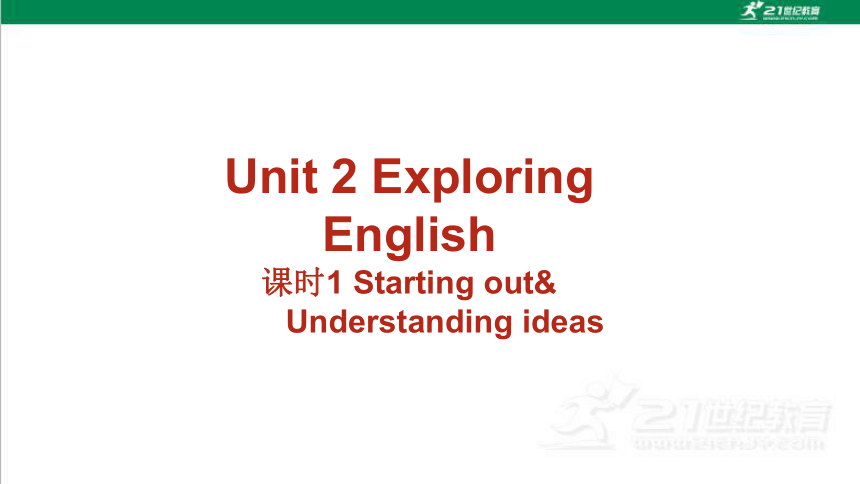 | |
| 格式 | ppt | ||
| 文件大小 | 10.8MB | ||
| 资源类型 | 试卷 | ||
| 版本资源 | 外研版(2019) | ||
| 科目 | 英语 | ||
| 更新时间 | 2025-07-19 13:08:50 | ||
图片预览

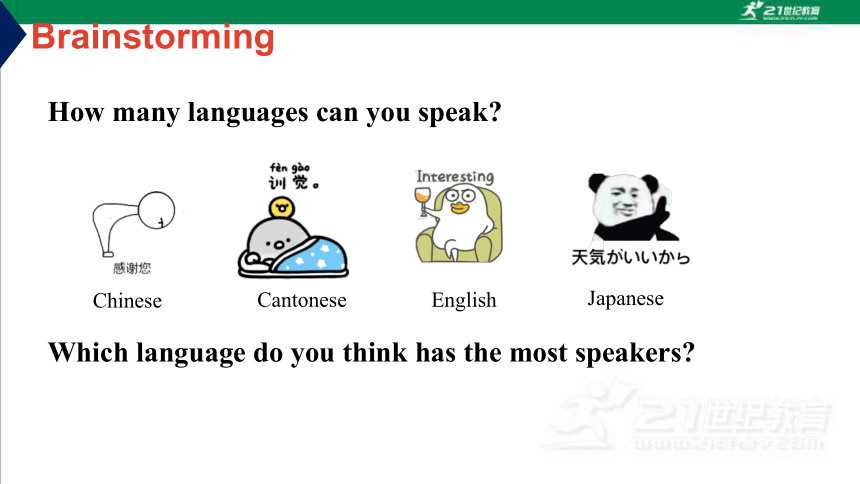
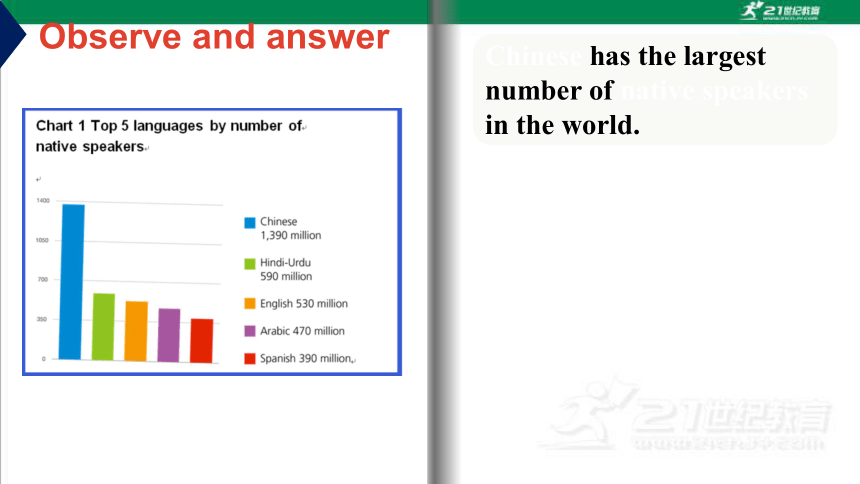
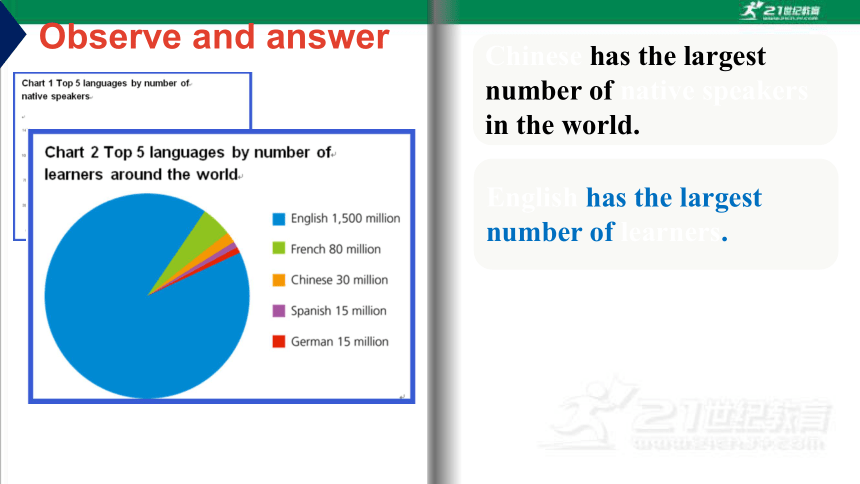
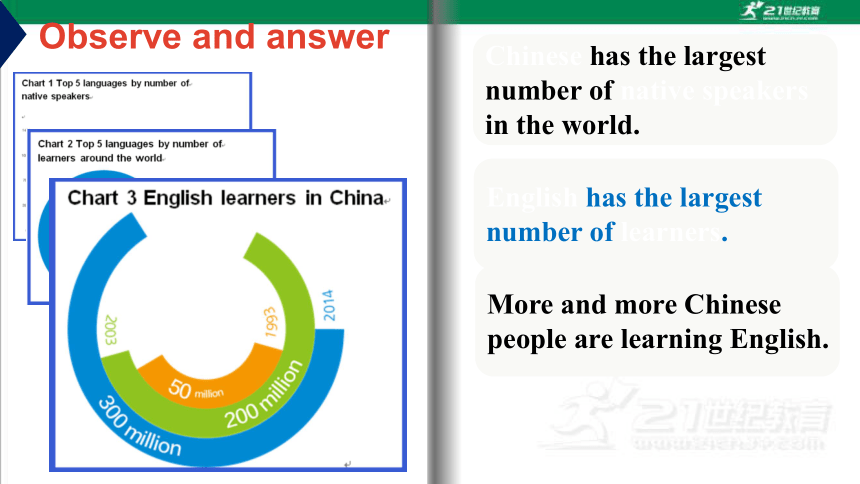


文档简介
(共17张PPT)
Unit 2 Exploring English
课时1 Starting out&
Understanding ideas
Brainstorming
How many languages can you speak
Which language do you think has the most speakers
Chinese
Cantonese
English
Japanese
Observe and answer
According to Chart 1, which language has the largest number of native speakers
Chinese has the largest number of native speakers in the world.
Observe and answer
According to Chart 2, which language has the largest number of learners
Chinese has the largest number of native speakers in the world.
English has the largest number of learners.
Observe and answer
What can you learn from Chart 3
Chinese has the largest number of native speakers in the world.
English has the largest number of learners.
More and more Chinese people are learning English.
Free talk
Why do you think many people in China learn English
Economic globalization
Job hunting
Learn more cultures
Traveling
Self-improvement
……
Activity 1
What is the passage about
Food
Cooking
Words
Plants
Fruit
2mins
Activity 2 Read para.1 and find out the topic sentence
This got me thinking how English can be a crazy language to learn
Can you guess it’s a fact or an opinion from this sentence
author’s opinion
Fast reading (2 mins)
Choose the author’s writing purpose
1 To tell that English is very difficult to learn.
2 To give advice on how to learn English.
3 To show that English is interesting and creative.
4 To explain how English was created.
Careful reading 5mins
Read the passage again and fill in the blanks
unique
hamburger
pineapple
painting
airsick
carsick
homesick
opposing
behaviors
fill out
invisible
ends
reflects
Activity 3 The passage can be divided into how many parts
Part 1 the author’s opinion
Part 2 examples
Part 3 conclusion: the reason
1.What made the author think more about English
A.Meeting trouble learning English.
B.The question from the author's child.
C.Finding no egg in the eggplant.
D.Needing a hamburger to feed the child.
Last reading:Think about the questions
2.How does the author develop the passage
A.By providing examples.
B.By making comparisons.
C.By following the way of spelling.
D.By following the order of importance.
3.Why does the author say “English was invented by people”?
A.Because the English words show everything around us.
B.Because the language helps us communicate with others.
C.Because the language proves how creative human being is.
D.Because the English words are unique in the world.
Do you have any difficulty 1. (learn)English better Have you ever wondered why there is no ham 2. your hamburger 3.___ why you can’t find any egg in eggplant Maybe this will get you 4._______ (think)how crazy the language of English is. We like to paint a 5.______(paint),and we are traveling in 6.__ car but we take photos and travel on the bus. When we see the rain, we say “it 7. (rain)”but no sunshining to use when seeing sunshine. The words are really 8.__________(confuse).Such unique 9. (mad)can be seen almost everywhere because English 10. (reflect)the creativity of the human race.
Retelling: Fill in the blanks
learning
in
and
thinking
painting
the
is raining
confusing
madness
reflects
Read the following information and answer the questions
1 How did pineapple, hamburgers and eggplants get their names
2 What are the characteristics of English according to the text and the information above
diversity
creativity
complexity
unique
interesting
enjoyable
Activity 4 What is the author’s attitude towards English
Find out the topic sentence of para.1, 6 and 7
This got me thinking how English can be a crazy language to learn.
You also have to wonder at the unique madness of a language……
English was invented by people, not computers, and it reflects the creativity of the human race.
What do you find most challenging about learning English
How do you deal with this
Think and Share
words
pronunciation
grammar
communication
interest
Unit 2 Exploring English
课时1 Starting out&
Understanding ideas
Brainstorming
How many languages can you speak
Which language do you think has the most speakers
Chinese
Cantonese
English
Japanese
Observe and answer
According to Chart 1, which language has the largest number of native speakers
Chinese has the largest number of native speakers in the world.
Observe and answer
According to Chart 2, which language has the largest number of learners
Chinese has the largest number of native speakers in the world.
English has the largest number of learners.
Observe and answer
What can you learn from Chart 3
Chinese has the largest number of native speakers in the world.
English has the largest number of learners.
More and more Chinese people are learning English.
Free talk
Why do you think many people in China learn English
Economic globalization
Job hunting
Learn more cultures
Traveling
Self-improvement
……
Activity 1
What is the passage about
Food
Cooking
Words
Plants
Fruit
2mins
Activity 2 Read para.1 and find out the topic sentence
This got me thinking how English can be a crazy language to learn
Can you guess it’s a fact or an opinion from this sentence
author’s opinion
Fast reading (2 mins)
Choose the author’s writing purpose
1 To tell that English is very difficult to learn.
2 To give advice on how to learn English.
3 To show that English is interesting and creative.
4 To explain how English was created.
Careful reading 5mins
Read the passage again and fill in the blanks
unique
hamburger
pineapple
painting
airsick
carsick
homesick
opposing
behaviors
fill out
invisible
ends
reflects
Activity 3 The passage can be divided into how many parts
Part 1 the author’s opinion
Part 2 examples
Part 3 conclusion: the reason
1.What made the author think more about English
A.Meeting trouble learning English.
B.The question from the author's child.
C.Finding no egg in the eggplant.
D.Needing a hamburger to feed the child.
Last reading:Think about the questions
2.How does the author develop the passage
A.By providing examples.
B.By making comparisons.
C.By following the way of spelling.
D.By following the order of importance.
3.Why does the author say “English was invented by people”?
A.Because the English words show everything around us.
B.Because the language helps us communicate with others.
C.Because the language proves how creative human being is.
D.Because the English words are unique in the world.
Do you have any difficulty 1. (learn)English better Have you ever wondered why there is no ham 2. your hamburger 3.___ why you can’t find any egg in eggplant Maybe this will get you 4._______ (think)how crazy the language of English is. We like to paint a 5.______(paint),and we are traveling in 6.__ car but we take photos and travel on the bus. When we see the rain, we say “it 7. (rain)”but no sunshining to use when seeing sunshine. The words are really 8.__________(confuse).Such unique 9. (mad)can be seen almost everywhere because English 10. (reflect)the creativity of the human race.
Retelling: Fill in the blanks
learning
in
and
thinking
painting
the
is raining
confusing
madness
reflects
Read the following information and answer the questions
1 How did pineapple, hamburgers and eggplants get their names
2 What are the characteristics of English according to the text and the information above
diversity
creativity
complexity
unique
interesting
enjoyable
Activity 4 What is the author’s attitude towards English
Find out the topic sentence of para.1, 6 and 7
This got me thinking how English can be a crazy language to learn.
You also have to wonder at the unique madness of a language……
English was invented by people, not computers, and it reflects the creativity of the human race.
What do you find most challenging about learning English
How do you deal with this
Think and Share
words
pronunciation
grammar
communication
interest
